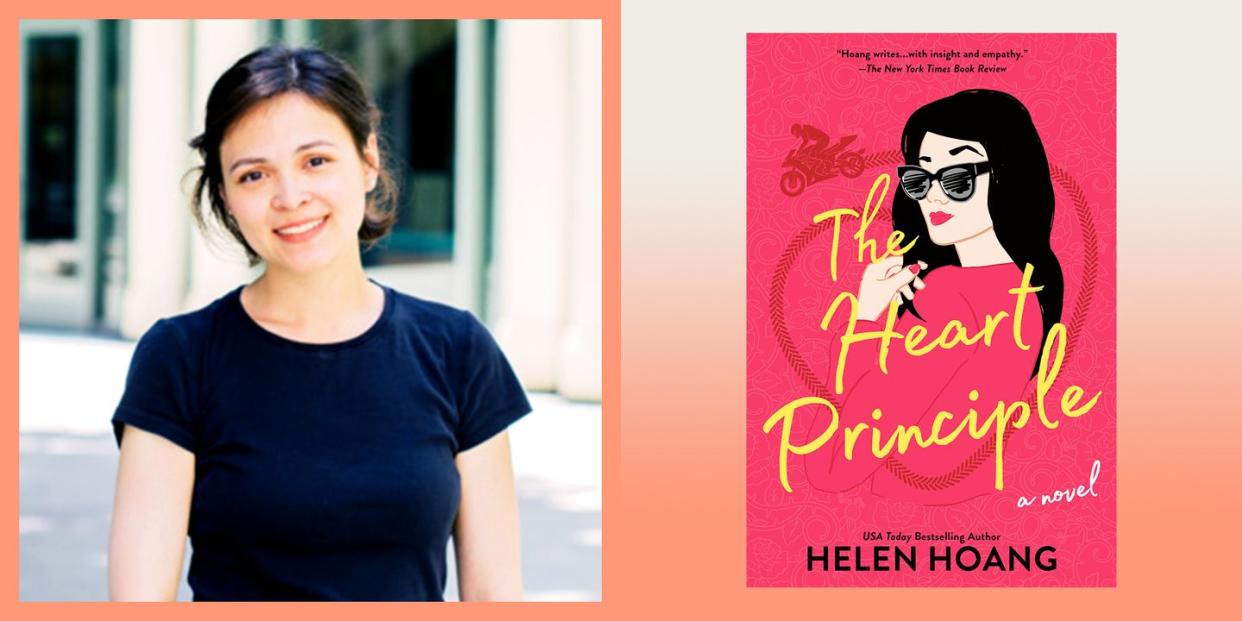Writing My Latest Romance Helped Me Claw My Way Out of Depression

"Hearst Magazines and Yahoo may earn commission or revenue on some items through the links below."
Helen Hoang is the USA Today bestselling author of romance novels The Kiss Quotient and The Bride Test. Her third book, The Heart Principle, is on sale now. She currently lives in San Diego, California, with her husband, two kids, and pet fish.
Relief and self-loathing.
That’s what I felt when my grandma passed away more than 10 years ago, and then again when my mom died in December 2018. Relief because I’d been hoping for an end to their suffering, and self-loathing because it seemed wrong to feel that relief. But my days providing end of life care for them both are some of the loneliest and most desolate that I’ve known.
I wrote my latest romance novel, The Heart Principle, as I was clawing my way out of the burnout and depression that resulted from those experiences. In a way, it was a type of therapy. Writing Anna helped me process what I’d gone through and pinpoint where things went wrong. It also served as an outlet for all the emotions that I hadn’t been able to give voice to.
Like Anna’s father, my grandma suffered from a serious stroke that paralyzed half her body, leaving her bedridden, dependent on others for all her needs, and completely devoid of the will to live. In contrast, as my mother was losing her battle with lung cancer years later, she was desperate to survive, while in intense pain and in deep denial about the reality of her condition. The resulting situation was profoundly heartbreaking to witness.
In both cases, my mental health deteriorated to the point where I often cried through the night and fantasized about escape by any means. But I didn’t feel like I could talk about it. Caring for our elders is an important part of Vietnamese culture. There’s pride to be had in it and bitter judgement for those who don’t participate (unless they’re male, which is a different matter entirely). My older sisters all flew into town to care for our mom. One even quit her job so she could help full time. The greater the self-sacrifice, the greater the honor.
By the same logic, there’s no honor in being selfish, and that’s how I perceived myself—selfish. I hated what I was being asked to do—the futility of it, constantly bearing witness to such suffering, feeling so alone, thinking that the situation would stretch on indefinitely—and I hated myself for hating it. I didn’t know I had caregiver burnout. I’d never heard of such a thing. The term only became familiar to me during the COVID-19 pandemic, when I read about the epidemic of caregiver burnout affecting medical professionals caring for the sickest patients.
While I was caring for my mom, things eventually got bad enough that I tried to communicate what was happening to me, but instead of improving the situation, I lost my family’s respect by speaking up. My mental pain couldn’t be acknowledged when my mom was in so much physical pain. How could I dare consider my own needs when she was fighting for her life? This drove me deeper into a despair and emotional isolation that only worsened after my mom died. In fact, when I tried to pick up my life where I’d left off, my mental health degenerated until I needed medication and help from a psychiatrist.
The Cleveland Clinic defines caregiver burnout as, "a state of physical, emotional and mental exhaustion. It may be accompanied by a change in attitude, from positive and caring to negative and unconcerned. Burnout can occur when caregivers don't get the help they need, or if they try to do more than they are able, physically or financially."
As it is, I’m so lucky that I had my husband’s support and the resources that I did. Many others can’t say the same. While ultimately healing, writing The Heart Principle was challenging work. I wasn’t well. I could only focus for a few hours a day, and sometimes, the scenes I wrote paralleled my life so closely that I spiraled back into depression, unable to be productive for weeks. Fortunately, unproductivity is something this ordeal has taught me to allow myself. In order to get better, I needed time. Time to sit in the sun and enjoy nature. Time to watch nonsense on TV. Time to cry. Time just to be bored.
That’s the most important thing that I’ve taken away from all of this: I need to be kind to myself. It’s something I must consciously choose, sometimes on a daily basis, sometimes even more frequently than that, and I’m not always successful. To be honest, I often fail spectacularly. And for my readers who are facing similar challenges in their lives, I hope I give them a voice. They’re not alone, and they should not feel ashamed if they’re hurting. They’re not “less.” They’re human, just like I am.
And the beauty of romance? It centers human emotions—“good” ones, “bad” ones, and everything in between—and provides a framework for everyone, even those struggling with mental health issues, to be loved and achieve a Happily Ever After.
Our capacity for compassion is one of the most beautiful aspects of our humanity, but I think we commit a disservice when we only permit ourselves to project kindness outward and not inward. Romance novels are about overcoming life’s obstacles to find lasting love, usually from someone else.
It may sound cliche, but as I wrote The Heart Principle and concurrently struggled with burnout, I repeatedly saw that the person I most need to love me is...me. And that isn’t selfish. It’s absolutely essential for recovery.
Want more stories to inspire you to live your best life? Sign up to become an Oprah Insider!
You Might Also Like